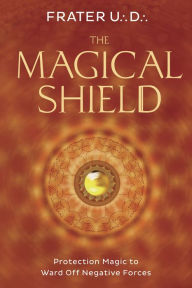Frater U.:D.: opens The Magical Shield with a discussion of the human being within a threefold classification of body, mind, and soul which he delves into in deep detail. Historical and cultural context is provided for each classification, as well as alternative models. It is an extremely detailed and even-handed discussion conducted within a framework of humanity's evolution into a being which has comprehensively brought its environment -- the planet -- under its control. Such a being must, in order to survive, put its own house in order to avoid setbacks: illness, 'bad luck'. This chapter is solely to weed out anyone looking for easy answers, it is unnecessary, wordy, dry, and the author uses 'we' throughout. making this reviewer feel annoyed almost constantly.
The author then turns to an 'Instruction Manual for Magical Shield Training,' starting with the injunction "no stress!". While such a statement is annoying, from there on out the book gets downright practical, moving into a catalog of real and alleged hindrances to the reader having attained their life goal and a magickal technique for eliminating them (symbolically) from one's life.
Many instructions are presented: this is, in many ways, a workbook disguised as a text. It will take the reader months, if not years, to tackle all of the exercises and do the work offered by Frater U.:D.:. (I confess I read the text, I did not do the exercises.) It's daunting and scary and, if truly tackled, would release a great deal of negativity from one's life. Included is a great deal of sigil work, practical affirmations, and useful psychology.
Light reading this book is not! Nor is it anywhere 'beginner' level, and these are statements from someone who has been known to take on Eliphas Levi. I suspect the book is also marred a bit by (likely) being written in the author's non-native language (which is German). I say that because the prose is often as dry as Joshua Tree and incredibly dense. For example: "It's a part of the automization of the untutored human motoric always to steer towards the closest, or more precisely, the next-closest-seeming support point."
I found the chapter "Self Protection Begins With Yourself" to be the most interesting and useful. The chapter opens with a discussion on recognizing self-destructive behaviors, moves through reasons why the mind can be so difficult to alter, and ends with guidance on how to nurture the soul into health.
Each chapter is dense with information and guidance and ultimately I would recommend -- with reservations because of the overly dry, dense writing.
~review by Lisa Mc Sherry
Author: Frater U.:D.:
Llewellyn Publications, 2016
pp. 288, $16.99
The Magical Shield: Protection Magic to Ward Off Negative Forces

©
2010 - 2026
Facing North
